OFFICE FOR EQUITY, DIVERSITY, INCLUSION & BELONGING | 2022-23


OFFICE FOR EQUITY, DIVERSITY, INCLUSION & BELONGING | 2022-23

Harvard President Lawrence S. Bacow
President Lawrence S. Bacow announced his intention to step down in June 2023. Throughout his tenure, Bacow has been a steadfast voice for the value of higher education in meeting the world’s most complex challenges, and serves as an example of collaboration, the respectful exchange of ideas, and the importance of diversity and inclusion in realizing the University’s mission.
President Bacow continues to call on Harvard to rigorously examine and debate a range of ideas, and to consider and embrace diversity of every variety as a source of strength and innovation. During his tenure, the University has continued to fund EDIB initiatives including, the Presidential Initiative on Harvard
BELOW: Lawrence S. Bacow, the 29th president of Harvard University, pictured at Commencement in 2019, is credited for defending affirmative action, supporting students in the Deferred Action for Childhood Arrivals, and leading efforts to reckon with Harvard’s past entanglements with slavery.
and the Legacy of Slavery and the Harvard and Culture Lab Innovation Fund grants, and build infrastructure including establishing the Dr. Martin Luther King Jr. Commemorative Lecture at Harvard, and growing the University’s OEDIB office and inclusive hiring initiative (hr.harvard.edu/inclusive-hiring-initiative) just to name a few.
As a champion for opportunity and equity, President Bacow has added his voice on the national stage in support of the most vulnerable in our society, highlighting the importance of the free flow of ideas and people across borders and expanding access to educational opportunities, while speaking out against white supremacy and racism. Learn more about President Bacow and his tenure: harvard.edu/president
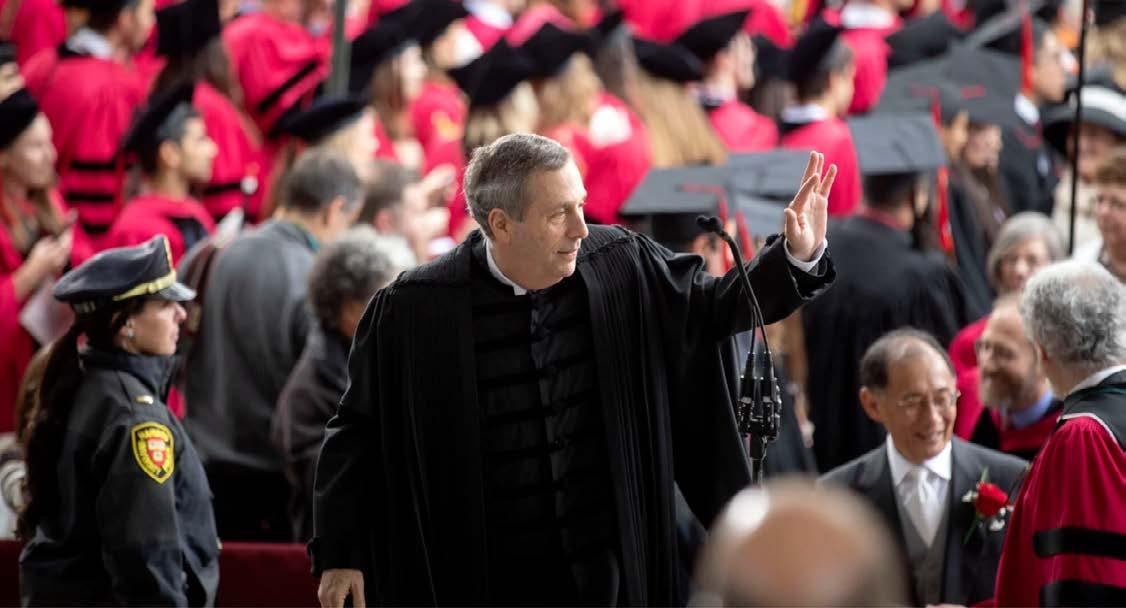
Inclusive Excellence acknowledges that true excellence requires diversity, equity, inclusion, belonging, and anti-racist policies, processes, and initiatives as
fundamental. By aspiring to represent the broadest range of ideas, disciplines, backgrounds, and perspectives, Harvard aspires to Inclusive Excellence.
After listening to stakeholders and gathering data from across the University, OEDIB identified key target areas of focus for both long- and short-term projects.
⬛ Presidential Task Force on Inclusion and Belonging is established.
⬛ Lawrence S. Bacow becomes the 29th president of Harvard.
⬛ Schools and Units complete initial EDIB strategic planning.
⬛ Office for Diversity, Inclusion, and Belonging is created within the Office of the President.
⬛ Final Task Force report provides recommendations for advancing EDIB work.
⬛ First Harvard-wide Pulse Survey on Inclusion and Belonging.
⬛ Inaugural meeting of the DIB Leadership Council with representatives from each School.
⬛ Harvard Culture Lab (HCLIF) launches with $250,000 from the President’s fund to seed innovative EDIB projects.
⬛ First HCLIF winners are announced and begin implementing projects.
⬛ Inaugural CDIO officer Sherri Ann Charleston is hired and begins an eight-month listening tour.
⬛ University-wide Community Dialogue Series, cohosted by the Office of the President, and Community Spaces for Affinity Groups launch.
⬛ Launch of University Discrimination and Harassment Policy Review.
⬛ ODIB is restructured to include Affirmative Action/Equal Employment Opportunity team.
⬛ ODIB hosts a week-long series of events in honor of Juneteenth.
⬛ Office relaunches as Harvard Office for Equity, Diversity, Inclusion, & Belonging (OEDIB).
2022
⬛ Dr. Martin Luther King Jr. Commemorative Lecture established.
⬛ OEDIB organizes Harvard-wide EDIB Forum.
⬛ OEDIB hosts support event after the Harvard and the Legacy of Slavery report release.
⬛ OEDIB leads studentled affinity graduations.
⬛ OEDIB and partners unveil new gender/ gender identity options in people management systems.
⬛ OEDIB hosts BIPOC Welcome.
⬛ MLK Lecture honors Freeman A. Hrabowski, III.
As we looked to the future, considering new values, practices, and goals, the Report of the Presidential Committee on Harvard and the Legacy of Slavery confronted the University’s past and the ways in which it participated in and benefited from the slave trade and slave labor.
Guided by seven recommendations from the Presidential Committee, the work to reckon with Harvard’s past has just begun and will continue to inform work and intentional steps to ensure honesty about Harvard’s past, and creating an equitable and inclusive future.
In April 2022, OEDIB organized and launched
BELOW: Freeman A. Hrabowski, III delivered the inaugural Dr. Martin Luther King Jr. Commemorative Lecture on October 12 in Sanders Theatre. He is celebrated for his leadership in developing a national educational model for students from diverse backgrounds to excel in STEM. Watch the lecture at bit.ly/HarvardMLK2022.
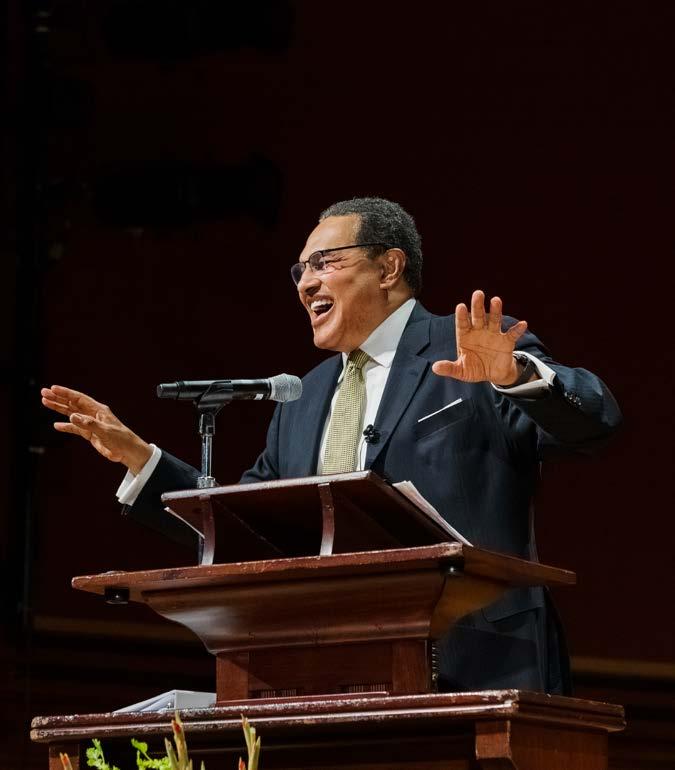
brought the community together to learn and engage with critical EDIB topics. The forum featured over a dozen breakout sessions, and speakers—including Bill Lee, Cornell William Brooks, Lauren Ridloff, LaTosha Brown, and many more.
The forum provided an opportunity for Harvard staff, faculty, and researchers to participate in professional development around EDIB issues and was a chance for individuals from across the University to network and socialize. Over 2,600 people registered, with attendees from every Harvard School represented. In a post-event survey, more than 90 percent of participants reported that their forum participation increased their knowledge of diversity and inclusion topics. Watch select forum videos online: bit.ly/EDIB-YouTube
Released in April 2022, the Report of the Presidential Committee on Harvard & the Legacy of Slavery (H&LS) documents the ways Harvard has profited from the exploitation of enslaved people and began the long work of reckoning with the legacy of the University’s entanglements with slavery.
In tandem, with the Report’s release, OEDIB organized two University-wide forums as spaces of support to reflect on the Report’s troubling findings and to begin a dialogue within the community. OEDIB also provided a comprehensive listing of similar School-level and local events. In partnership with the Harvard Radcliffe Institute, where the Presidential Committee is anchored, and with Sarah Bleich, the newly appointed vice provost for special projects, and her team will oversee the implementation of the initiative.
To learn more about H&LS visit: https://legacyofslavery.harvard.edu
In May, the OEIDB piloted a Harvard-wide model of student-led and staff-supported events. OEDIB staffed six ceremonies celebrating graduates from diverse backgrounds with nearly 1,400 students participating. All members of the Harvard community were invited to participate in ceremonies congratulating Asian Pacific Islander Desi-American, First Gen, LGBTQIA+/Lavender, Black, Latinx, and Indigenous graduates. OEDIB also supported a 2020/2021 graduates reception, with over 720 participants, and a Black undergraduate celebration.
In October 1962, Dr. Martin Luther King Jr. spoke at Harvard Law School about the future of integration and the path to racial justice. In honor of the 60th anniversary of that speech, President Bacow announced in January 2022 the annual Dr. Martin Luther King Jr. Commemorative Lecture to recognize individuals who through their dedication to activism, advocacy, scholarship, or service have made an indelible contribution to advancing justice and equality. OEDIB oversaw the inaugural public lecture honoring Freeman A. Hrabowski III, celebrated for his leadership in developing a national educational model for students from diverse backgrounds to excel in science, technology, engineering, and math. Nominations for the honoree were solicited from community members from across Harvard.
Learn more at: edib.harvard.edu/mlk-lecture
Hospitality
is most successful when we are inclusive in understanding the unique needs of our guests.
—SMITHA SAANDHYA HARI HANEEF, Managing Director, Harvard University Dining Services
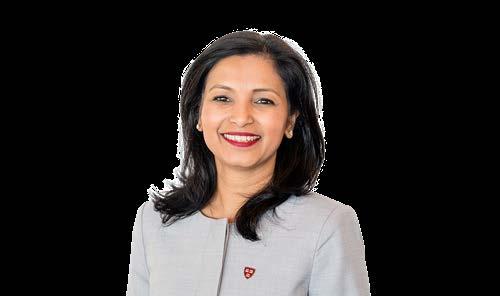
Harvard University Dining Services’ (HUDS) strategic vision incorporates community building and engagement while promoting health, cultural, environmental, and religious sensitivity. Led by Managing Director Smitha Haneef, HUDS celebrates diversity and fosters community by continually innovating the design of events, spaces, and offerings. “I have the privilege of supporting the University’s mission alongside a diverse team of professionals who extend the best of hospitality and help nourish our community,” says Haneef.
One example is a partnership with Harvard University Native American Program and OEDIB to celebrate Native American Heritage Month. This year’s celebration featured an expanded range of Indigenous recipes for dinner in undergraduate dining halls on November 15, and lunch at Harvard Law School on November 17. Recipes were sourced from an Indigenous HUDS chef, student submissions, and team research. HUDS’ Learnings Report details their inclusive and healthy hospitality programs for students and community members.
As momentum to tackle EDIB issues grows, finding creative ways to integrate efforts across Harvard’s complex and decentralized infrastructure is both a challenge and opportunity.
OEDIB’s work centers on forming new alliances—not just new initiatives—across all levels of the University. No single person or team can fully address EDIB issues. Partnership is central to creating equitable, sustainable responses to University issues and allows internal expertise and innovative ideas to flourish. Keeping participatory, inclusive collaborations at the heart of EDIB initiatives is vital to centering historically marginalized communities in EDIB conversations and grounding efforts in the ideas and experiences of those communities.
OEDIB meets and partners on awareness raising, inclusion, and accessibility initiatives guided by and focused on the experiences of community mem-
bers with disabilities. In partnership with University Disability Resources, OEDIB representatives serve on the Student Accessibility Advisory Group charged with elevating student voices on topics of accessibility across Harvard. OEDIB works regularly with Ability+, an affinity group for employees with disabilities and their allies.
OEDIB is represented on the Implementation Committee for Student Mental Health and Wellness, which is working to prioritize the recommendations of the July 2020 Report of the Task Force on Managing Student Mental Health. The implementation committee is creating plans to operationalize the Report’s key recommendations, conducting an inventory of mental health and wellness resources across the University, and providing oversight and follow-up on progress.
In partnership with Harvard Human Resources Center for Workplace Development, OEDIB continued the development of the DIB academy, a six-module professional development offering for Harvard benefits-eligible faculty, postdocs, and staff. The training series is an opportunity for community members to consider diversity in policies, process, and administrative work. Sessions added over the past year include: The Intersection of Power, Privilege, and Oppression; Microaggressions; Anti-Black Racism; and From Allyship to Accomplice.
In collaboration with admissions officers from across the University, the CDIO shared a message of welcome and encouragement to accepted students from historically marginalized or underrepresented backgrounds. OEDIB plans to partner with admissions offices in the upcoming year to welcome potential students at a spring 2023 One Harvard event.

Tomiko Brown-Nagin, Dean
Nisha Mongia, Executive Dean
HARVARD RADCLIFFE INSTITUTE


Nancy Coleman, Dean
Shirley Greene, Associate Dean of Students
HARVARD DIVISION OF CONTINUING EDUCATION
George Q. Daley, Dean
Joan Reede, Dean for Diversity and Community Partnership
HARVARD MEDICAL SCHOOL

Srikant Datar, Dean
Terrill Drake, CDIO
HARVARD BUSINESS SCHOOL

Emma Dench, Dean
Sheila Thomas, Dean for Academic Programs and Diversity
HARVARD GRADUATE SCHOOL OF ARTS AND SCIENCES

Francis J. Doyle III, Dean
Paula Nicole Booke, Assistant Dean DIB
HARVARD JOHN A. PAULSON SCHOOL OF ENGINEERING AND APPLIED SCIENCES

Douglas Elmendorf, Dean
Robbin Chapman, Associate Dean of DIB
HARVARD KENNEDY SCHOOL OF GOVERNMENT

Claudine Gay, Dean
Sheree Ohen, Associate Dean of DIB
HARVARD FACULTY OF ARTS AND SCIENCES

William V. Giannobile, Dean
Fadie Thomas Coleman, Assistant Dean, DIB
HARVARD SCHOOL OF DENTAL MEDICINE

David N. Hempton, Dean
Melissa Bartholomew, Associate Dean of DIB
HARVARD DIVINITY SCHOOL
By working together our actions and policies will continue to be more equitable and inclusive, ensuring that each staff member has the opportunity to thrive.
—MEREDITH WEENICK, Executive Vice President
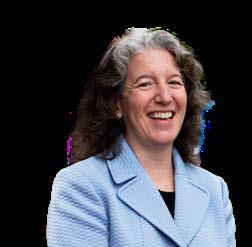
, we aspire to reach our full potential in scholarship and education, and also in how we value, include, and respect one another. We can only achieve the former if we succeed in the latter.
—ALAN M. GARBER Provost and Chief Academic Officer
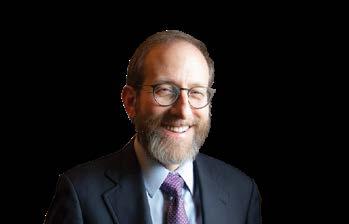
OEDIB supports campus-wide conversations about reimagining safety led out of the Office of the Executive Vice President. CDIO Sherri Charleston is a member of the executive steering group and OEDIB staff serve as members on the campus engagement planning committee. The first conversation took place during the EDIB Forum in April 2022, with two additional conversations over summer and fall, with more planned in the upcoming year.
Schools and Units across Harvard also have dedicated offices and teams that advance the University’s diversity, inclusion, and belonging goals, each offering a wide range of programs and initiatives. Each School’s diversity officer and representatives from Harvard University Libraries, Health Services, and Native American Program serve on the EDIB Council. More information about local initiatives can be found at: edib.harvard.edu/schools-units

Rakesh Khurana, Dean
Alta Mauro, Associate Dean of Students for Inclusion and Belonging
HARVARD COLLEGE

Bridget Terry Long, Dean Ivonne M. Garcia, Director for DEI, Faculty and Staff Development Lead
Gregory Saint-Dick, Director for DIB, Student Development Lead
HARVARD GRADUATE SCHOOL OF EDUCATION

John F. Manning, Dean
Monica E. Monroe, Assistant Dean for Community Engagement, Equity, and Belonging
HARVARD LAW SCHOOL




Sarah M. Whiting, Dean
Naisha Bradley, CDIO
HARVARD GRADUATE SCHOOL OF DESIGN
Michelle A. Williams, Dean
Lilu Barbosa, CDIO
HARVARD T.H. CHAN SCHOOL OF PUBLIC HEALTH
Kelli Mosteller, Executive Director
HARVARD UNIVERSITY NATIVE AMERICAN PROGRAM
Laurie Nicolas, Director for Equity Diversity, Inclusion and Belonging
HARVARD UNIVERSITY HEALTH SERVICES
Jerome Offord, Associate University Librarian for Antiracism
HARVARD LIBRARY
Harvard continues its commitment to advancing diversity and equity for all community members. Creating a culture of belonging and inclusion is up to all of us and over the past year, OEDIB has been proud to convene and collaborate with stakeholders from across the University. This update highlights some of the advances and changes that have
been made in EDIB—from complex systemic changes in policy and processes to creating simple opportunities for individuals to connect across differences.
Over the next five years, Harvard will continue to support a culture of inclusion and equity by developing our infrastructure, facilitating partnerships, gathering data, and assessing the progress of EDIB efforts across campus.
ORGANIZATIONAL PHASE PERFORMANCE PHASE ASSESSMENT & REACTIVATION PHASE
2021–2022
What we achieved:
⬛ Eighteen-month organizational process and launch of first fiveyear strategic planning cycle
⬛ Established infrastructure for OEDIB and EDIB activities at Harvard
⬛ Launched targeted collaborations around high-impact initiatives
2023–2026
What we are working on:
⬛ Building a culture of organizational EDIB learning
⬛ Fostering a culture of belonging while enhancing recruitment and retention of faculty, researchers, staff, and students from historically marginalized groups
⬛ Facilitating an effective model of distributed EDIB diversity leadership
⬛ Utilizing and maximizing data to inform equity-minded policies, practices, and decision-making
2026+
Where we are going:
⬛ Strategic framework assessed and reactivated utilizing performance data
A collective, community commitment is a part of every phase of current activities and future plans. Access self-guided learning resources, get event information, or apply to get your EDIB project funded.
Apply for Culture Lab funding: edib.harvard.edu/culture-lab
University-wide and school-based EDIB resources: edib.harvard.edu/resources
Self-guided learning guides and toolkits: edib.harvard.edu/guides-toolkits
Register for an upcoming event: edib.harvard.edu/events
Read the 2019 Pulse Survey results: pulse.harvard.edu/results
Subscribe to the OEDIB Newsletter: Mailchi.mp/2fc75fe8ea74/dib
“ ”
We want to build a community in whic ER h all of us feel lik SI e we can be not only agents of change, but also support for members of the community in times of challenge and need.